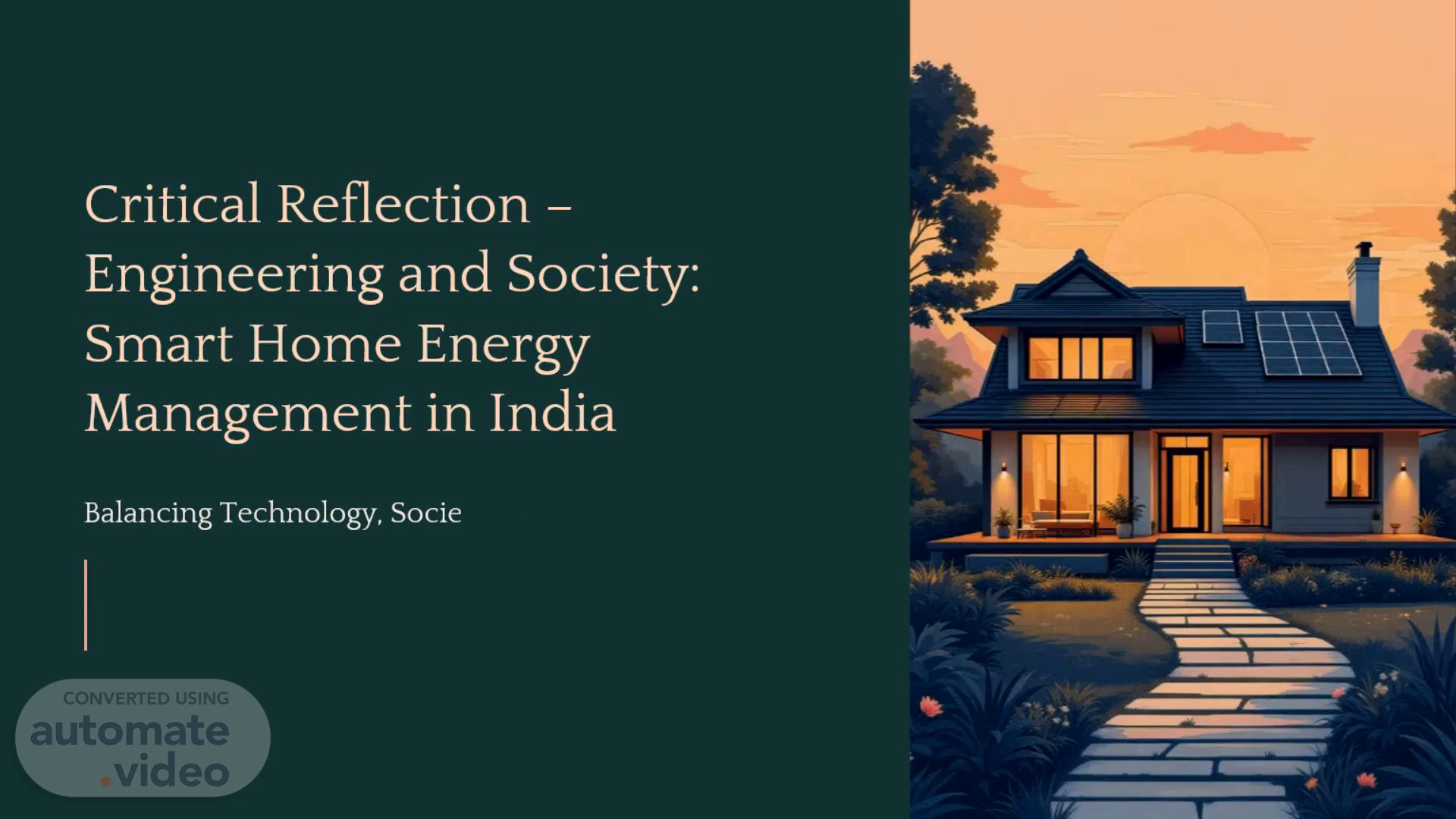
Critical-Reflection-Engineering-and-Society-Smart-Home-Energy-Management-in-India
Scene 1 (0s)
Critical Reflection – Engineering and Society: Smart Home Energy Management in India.
Scene 2 (11s)
The Role of Engineering in Shaping a Sustainable Future.
Scene 3 (1m 7s)
[Audio] Societal Impact and Bridging the Digital Divide Designing technology for India requires acknowledging vast socioeconomic and lifestyle diversity—from densely populated urban centres to sprawling rural areas. Inclusivity and Accessibility We must design S-H-E-M-S solutions that are accessible and affordable across all socioeconomic strata, including economically weaker sections. Universal Indian Home Compatibility Technology must unify disparate devices and brands. Standardisation is crucial for ensuring ease of installation and use, regardless of the home's technological base. Mitigating the Digital Divide Without inclusive strategies, S-H-E-M-S adoption will favour affluent, urban users. Engineers must collaborate with policymakers to ensure equitable access, affordability, and necessary digital literacy education. For example, consider the limited accessibility of smart metering infrastructure in rural areas today—a precursor to S-H-E-M-S adoption challenges..
Scene 4 (2m 20s)
[Audio] Environmental Responsibility and Life Cycle Assessment While S-H-E-M-S promote sustainability through operational efficiency, true environmental responsibility requires a holistic view of the technology's entire lifecycle. Operational Savings SHEMS reduce energy consumption by optimising usage, lowering carbon emissions, and facilitating the integration of domestic renewables like rooftop solar. National Alignment The technology directly supports India’s commitments to ambitious climate goals and sustainable development targets. Life Cycle Assessment (L-C-A--) Design must consider the full environmental impact—energy and materials used for manufacturing, maintenance, and, critically, disposal to avoid generating electronic waste (e waste)..
Scene 5 (3m 16s)
[Audio] Ethical Design: Data Privacy and Security Smart Home Energy Management Systems are inherently data intensive, recording sensitive patterns of domestic life, schedules, and occupancy. The Privacy Imperative: Who owns the data, how is it secured, and is its potential sharing with third parties fully transparent? Engineering ethics demand informed consent and robust privacy by design principles. A key technical solution to mitigate risk is: Offline Processing / Edge Computing By processing sensitive data locally on the device (at the 'edge'), we can significantly enhance security, reduce reliance on continuous internet connectivity, and limit the risk of cloud based data breaches..
Scene 6 (4m 4s)
[Audio] Socioeconomic Benefits and Barriers to Adoption Smart energy management offers clear financial incentives but faces significant upfront economic hurdles for widespread implementation. 20% 99% £150 plus Reduced Bills Grid Stability Installation Cost Potential average savings for households through optimised consumption and reduced peak load charges. Positive effects on national energy security by better managing and distributing demand across the power grid. The high initial cost of S-H-E-M-S installation and ongoing maintenance remains a primary barrier for mass adoption in India. Furthermore, while Gamification can encourage energy saving behaviour, we must balance automated efficiency with user agency, preventing over dependence on technology or discouragement from manual involvement..
Scene 7 (5m 5s)
[Audio] Cultural Context and Local Relevance Engineering solutions are not culturally neutral; they must respect and integrate local values, habits, and national aspirations to achieve high user acceptance. Aatmanirbhar Energy Har Ghar Solar Vision Community Centric Design The concept of self reliance, applied to energy, means promoting intelligent, autonomous use and local generation through technologies like SHEMS. SHEMS are central to the national goal of making solar power accessible and manageable in every single home. Cultural sensitivity is key. Iterative design processes that incorporate community engagement and local feedback enhance usability and overall acceptance..
Scene 8 (5m 58s)
[Audio] The Essential Multidisciplinary Approach Developing truly effective and responsible S-H-E-M-S requires bridging traditional disciplinary silos. Technology alone cannot solve the complex social challenges. Engineering Environmental Science Ethics Social Sciences Technical Design & Innovation User Behavior & Equity Life Cycle Impacts Privacy & Transparency.
Scene 9 (6m 25s)
[Audio] Conclusion: Shaping a Just Energy Future Smart Home Energy Management Systems are not merely technological products; they are potent drivers of social change, influencing energy interaction and environmental stewardship. Engineering responsibility must encompass: Ensuring inclusivity and access for all strata of Indian society. Upholding strong ethical standards, particularly in data privacy and user control. Committing to environmental care beyond operation, addressing the full life cycle. Aligning design with India’s unique cultural and socioeconomic context..
Scene 10 (7m 8s)
[Audio] Call to Action Engineers must embrace multidisciplinary collaboration to shape a future where Indian homes are smart, sustainable, and equitable. The creation of a just energy future for India is dependent upon thoughtful, socially aware engineering..